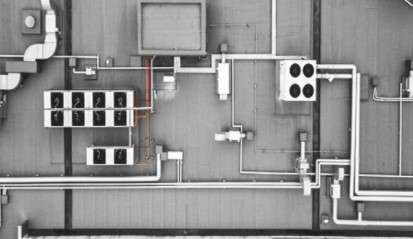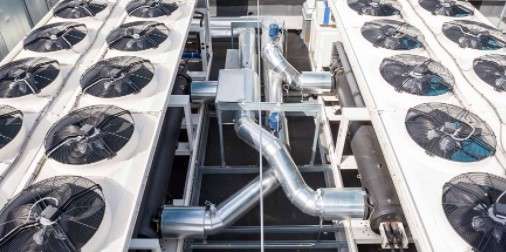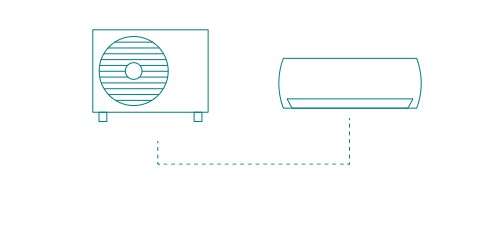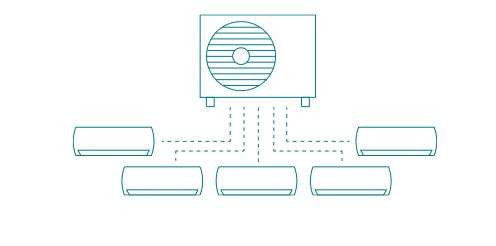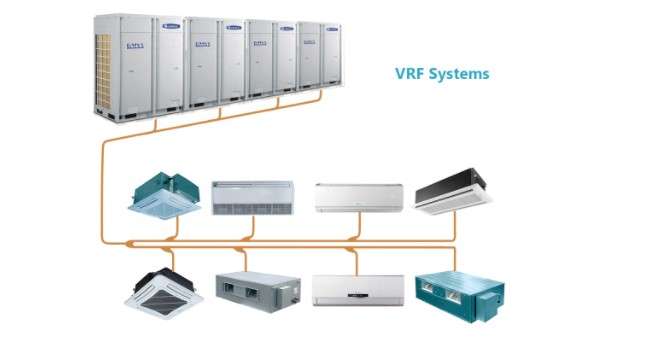According to the IRS, the HVAC system is a structural element of the facility. It provides environmental comfort in a commercial or residential building through thermal manipulation. An HVAC system in a commercial building makes occupants productive, healthier, and happier.
There are different popular types of HVAC systems available to regulate the entire indoor temperature and optimize air cleanness. They all work quite different of each other to control indoor air conditions. If you want to ensure a blissful working environment, you must know about Different Types of Commercial HVAC Systems.
After researching various commercial HVAC systems, here we’ll discuss several categories of them. So why don’t we dive in deep!
What Is A Commercial HVAC System?
We all know that a commercial area or building is a large area or a compartment covering a vast area. So, a commercial HVAC system is a system that contains an interconnected system that comes up with heating, cooling, and ventilation systems within a structure.
The system works to regulate indoor air quality, temperature, and humidity in a larger building. For instance, in summer, an HVAC system does the same job that a whole house dehumidifier does.
According to Kyle Buscher, service manager at Minnesota HVAC company, A commercial HVAC system is the same unit as a residential unit in basic functionality with more equipment essentially. It comes with chillers, heat pumps, heaters, and a rooftop outdoor unit.
You will find industrial or commercial building HVAC systems in business areas, like hospitals, offices, hotels, schools, universities, and industrial buildings. A commercial HVAC system aims to provide below 75 degrees Fahrenheit and control relative humidity between 40-60% after proper installation.
How Does Commercial HVAC System Work?
An HVAC is a necessary part of any commercial system. A well-performed HVAC system helps to ensure a good working environment during freezing winter or in a hot summer by reducing excess moisture. So, the related question arises, How does a commercial HVAC system work?
In a commercial HVAC system, the heat pump removes heat from the air or sometimes water for heating purposes. The heat pumps water on source pipes. It supplies water throughout the building. The rooftop units may also be on the ground and work to push conditional air within the structure.
The function of chillers is to generate cool water, distributed by pipes in the air cooling coils. In a commercial HVAC system, the heaters come in two major types—radiant and furnaces heaters. The radiant heaters utilize infrared radiation and furnaces help to burn the fuel to heat the air inside the structure.
Commercial HVAC System Operations
The word HVAC means heating, ventilation, and air conditioning. In a commercial HVAC unit, all those three components work together to run an HVAC system. All HVAC equipment is designed to operate complexities with cooling or heating systems on a large scale.
Since the commercial HVAC system is robust, that’s why it needs many different parts to complete its operational function. A thermostat helps to control the HVAC system. It sends a signal to the system to generate cool or heat air depending on the temperature set.
The function of a furnace is to provide heat. A heat exchanger inside the furnace is used to heat the pulled air. Lastly, ductwork and vents transfer the cooled and heated air inside your commercial building.
Different Types Of Commercial HVAC Systems
Different Types of Commercial HVAC Systems perform a common task: control the air, humidity, and temperature. The category of commercial HVAC systems is countless because of individual requirements and unique circumstances.
However, there are three main affordable types of HVAC systems that you can get for a distinct purpose. Have a look at below to decide which one fulfills your need.
It is an affordable option to deal with a smaller commercial area like restaurants, coffee shops, small offices, super shops, etc. A Single-split system provides individual heating and cooling for an apartment unit. If you have a large space, they can control your room by heating and cooling.
A Single-split system is more economical than central commercial HVAC units. This system works with an air conditioner, evaporator coil, and furnaces. The best thing about this system is that it can be controlled by using a DDC system or a thermostat.
2. Multi-Split System
The multi-split system is mostly similar to a single split. The only difference is you need to connect it with up to nine indoor units. This connection should be complete with an outdoor central unit. In this system, inverter technology is used to control the variable speed.
A Multi-split system is frequently used in large spaces of office buildings, retail stores, and healthcare facilities. In this system, heat pumps work as a natural inclination to move cool areas to war areas. This saves energy and money over the traditional air conditioners.
3.VRF or VRV system
The word VRF and VRV stands for variable refrigerant flow and variable refrigerant volume system. Where both indicate the same type of commercial HVAC system. Both two terms are used to define the same type of system interchangeably.
For a medium to a large building, or for large office space, hotels, VRV/VRF can be the best choice for you. Before getting, remember there are two types of systems: Heat Pump and Heat recovery.
The heat pump system works by either cooling or heating a building and this is good for an open plan area. Besides, a heat recovery system can supply cooling and heating simultaneously. This is the best option when the building has various smaller rooms.
Conclusion
The features and components in a commercial HVAC system are more complex than any other system. For suits in your individual requirements, they often need customization. That’s why it’s crucial to pick the suitable one from Different Types of Commercial HVAC Systems.
So here we suggest, before installing an HVAC system in commercial spaces, understand their reliability, cost-effectiveness, energy efficiency, and difference. Talk with a contractor for Installation costs and regular maintenance after finishing the installation process.
If you have a further quarry about the commercial HVAC systems, comment on your question. Our expert will reach you soon. Thanks for your attention to this article.
